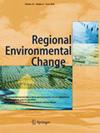各国如何制定气候变化框架?《联合国气候变化框架公约》国家信息通报中适应和缓解的全球比较
IF 3.6
2区 环境科学与生态学
Q2 ENVIRONMENTAL SCIENCES
引用次数: 1
摘要
自我报告是《联合国气候变化框架公约》的一项重要机制,用于收集各国为实现其气候变化减缓和适应目标所做的工作以及取得的进展情况。在这里,我们对四个假设进行了实证检验,这些假设是关于各国在通过国家信息通报进行自我报告时优先考虑什么。使用定量文本分析方法(结构主题建模和关键度统计),我们分析了600多份提交的材料(从1994年到2019年),发现证据表明,脆弱国家强调影响、脆弱性和适应,而不是缓解目标,而高排放国家往往更侧重于缓解。尽管《巴黎协定》被认为是一个“分水岭时刻”,但我们发现,在《巴黎协定》签署后,对气候解决方案的关注没有统计学上的显著增加,对适应的关注也没有显著增加。我们的全球评估和使用的方法提供了一个新的视角来理解政府认为重要的是什么。最后,我们就如何利用自我报告机制对气候行动进展进行全球盘点提供了一些思考。本文章由计算机程序翻译,如有差异,请以英文原文为准。
How do countries frame climate change? A global comparison of adaptation and mitigation in UNFCCC National Communications
Abstract Self-reporting is an important mechanism of the UNFCCC to collect information about what countries are doing to achieve their climate change mitigation and adaptation targets and how much progress has been made. Here we empirically test four hypotheses about what countries prioritise in their self-reporting through the National Communications. Using quantitative text analysis methods (structural topic modelling and keyness statistics), we analyse over 600 submissions (from 1994 to 2019) and find evidence that vulnerable countries highlight impacts, vulnerability, and adaptation rather than mitigation targets, whereas high-emitting countries tend to focus their messaging more on mitigation. Despite the Paris Agreement being considered a “watershed moment”, we find no statistically significant increase in focus on climate solutions post-Paris, and no significant increase in attention to adaptation. Our global assessment and the methods used offer a novel perspective to understand what gets framed as important by governments. Finally, we provide reflections on how self-reporting mechanisms can be used for global stocktaking of progress on climate action.
求助全文
通过发布文献求助,成功后即可免费获取论文全文。
去求助
来源期刊

Regional Environmental Change
环境科学-环境科学
CiteScore
6.80
自引率
2.40%
发文量
125
审稿时长
4.5 months
期刊介绍:
Environmental changes of many kinds are accelerating worldwide, posing significant challenges for humanity. Solutions are needed at the regional level, where physical features of the landscape, biological systems, and human institutions interact.
The goal of Regional Environmental Change is to publish scientific research and opinion papers that improve our understanding of the extent of these changes, their causes, their impacts on people, and the options for society to respond. "Regional" refers to the full range of scales between local and global, including regions defined by natural criteria, such as watersheds and ecosystems, and those defined by human activities, such as urban areas and their hinterlands.
We encourage submissions on interdisciplinary research across the natural sciences, social sciences and humanities, and on more focused studies that contribute towards the solutions to complex environmental problems. Topics addressed include (i) the regional manifestations of global change, especially the vulnerability of regions and sectors; (ii) the adaptation of social-ecological systems to environmental change in the context of sustainable development; and (iii) trans-boundary and cross-jurisdictional issues, legislative and governance frameworks, and the broad range of policy and management issues associated with building, maintaining and restoring robust social-ecological systems at regional scales.
The primary format of contributions are research articles, presenting new evidence from analyses of empirical data or else more theoretical investigations of regional environmental change. In addition to research articles, we also publish editorials, short communications, invited mini-reviews on topics of strong current interest, as well as special features that provide multifaceted discussion of complex topics or particular regions
 求助内容:
求助内容: 应助结果提醒方式:
应助结果提醒方式:


